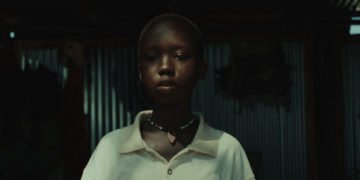Where the River Divides carried a palpable aura that wafted through the smiles and faces that graced its premiere at the Anga Diamond Cinema. Having successfully avoided any spoilers, trailers, or any information about the film beforehand, I had no idea what awaited me—not the 33-minute runtime that took me by surprise, nor the makers of the film, nor what the film was about. What I did manage to pick up from the whispers of those who attended the premiere was that I was about to experience one of the most beautiful Kenyan films I had ever seen. And it was.
As the opening scenes played over my eyes, I found myself burrowing through my mind for any memory of native Kenyan films. Maybe it’s the lack of funding to actualize memories or our industry being too ripe in its infancy to explore our history with genuineness; we simply seem to lack films that capture the day-to-day lives of Kenyans before or early into our independence.
Where the River Divides, directed by M.D. Neely rises to fill that void, exploring a small Luo rural clan in the 70s. The film is careful enough to adhere to the language, traditions, and mannerisms of its time while elevating itself with the most beautiful locations, costumes, and cinematography so that every scene, the consequential ones, and the fillers feel intricately placed to tell a coherent story.
The story itself, written by Matt Black, sees an ideological fight between a son and his father as the gospel the son brings to the clan attempts to usurp the tradition the clan has been founded on. Based on a true story, the narrative walks through the decades, planting its seed in the protagonist’s early childhood and concluding in the present, briefly but intimately touching on fatherhood, love, control, and the quest for salvation within and without traditions.
However, Where The River Divides glosses over the conflicts and the relationships, careful enough not to overstay its welcome, and for the most part, it allows the beauty of its scenes and the perfect acting of its cast like Fred Kasuku (Ochanda), Shandra Apondi (Mary), and Benjamin A. Onyango (Okoth) to carry the narrative as it speeds through the limited runtime.
As an artistic expression of a film, the film is beautiful, intimate, and well-made to stand above most Kenyan films released today. It doesn’t take the chastity of being one of the first to tell a native Kenyan story lightly, paying enough homage to the socioeconomic environs to suck the audience into its world and paying it off with a thematic narrative.
As a voice, however, as it was clearly intended to be, I find personal issues with it. If this film were to be released in an industry that produces numerous cultural Kenyan stories like Nollywood, I would rest here and give it all my praise. But it doesn’t. Where the River Divides is the first of its kind, and as visually appealing as it is, I find issue with the fact that the first Kenyan cultural story I’ve seen is so blatantly against the culture it so beautifully portrays.
I understand the film is funded by GNPI (Good News Productions International) Africa and Youth in Christ who are using film to preach the gospel, as is within their rights. And Where the River Divides tells its story as honestly as it possibly can, like the missionaries who brought the gospel to Kenyans all those decades ago, but it leaves a sour taste in my mouth when our traditions and cultures are vilified to exalt western salvation.
Perhaps if they had more time, there is reason to believe the makers of this film would have taken their time to reconcile the different ideologies they pit against each other to form the central conflict. Then again, there is more than one example of quality, successful films that use African culture as nothing more than some backward barbarism that heathens need to evolve out of. Like I said, if Where the River Divides was one of many like it in Kenya, telling its own thematic perspective in a sea of others telling theirs, I would gladly exalt it sorely as an artistic marvel. And maybe I will, in retrospect, down the years when we tell these same stories in our own voices and directions, but for now, I’d rather see a film reuniting our audience with its past, not forging evangelical milestones at its expense.
Where the River Divides is now streaming on My Movies Africa.
Enjoyed this article?
To receive the latest updates from Sinema Focus directly to your inbox, subscribe now.












I like your detailed reviews